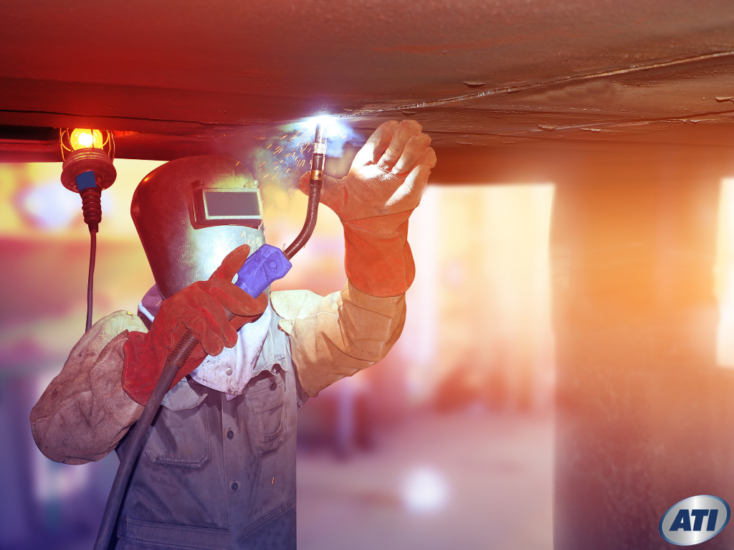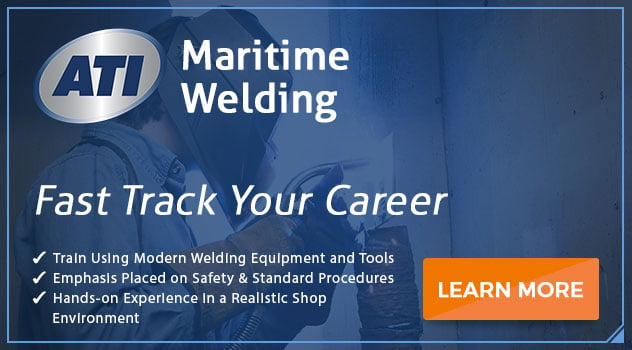Ship Welding Courses in Virginia: What Do I Need to Learn?

According to international research firm Ibis World, the United States shipbuilding industry is responsible for $25 billion in economic activity each year. Welders are an essential part of the shipbuilding process.
What is ship welding? How can those interested in this as a career path use a formal education to be more successful? What regulations must be fulfilled in order to work as a maritime welder in the state of Virginia?
Welding as Part of the Shipbuilding Process
Shipyards create nautical vessels for different purposes. Personal watercraft like pontoons, leisure canoes, and other small boats are generally produced in separate facilities from those destined for industrial or commercial applications.
While welders are needed for most types of shipbuilding, they are most important in creating the large sea vessels that companies rely on to move goods and people around the world. Welders use their skills to strengthen joints and seams, cut thick sheets of metal, and form materials into shapes that facilitate the production of sturdy vehicles. While welders use a variety of techniques, the main types used in shipbuilding are:
- Shielded metal arc
- Oxyacetylene
- Submerged arc
- Gas tungsten arc
- Gas metal arc
These welding techniques are used throughout the shipbuilding process, from forming the framework to securing interior structures. Welders help create ships used by the military, cruise ships, fishing vessels, and commercial transport vehicles.
Why Aspiring Shipbuilders Need a Formal Education
Does a ship welding career sound like the perfect path for you? It is possible to start a career with the knowledge gleaned from high school classes, on-the-job training, or self-taught techniques. However, starting your career off with a training program designed specifically for maritime welders gives you many advantages.
- Shipbuilding uses a variety of techniques. Completing a formal training program ensures that you are proficient in all the important welds before applying for employment. The depth of training you receive in your program will give you an advantage over your competition.
- Like other industries, open positions at shipyards may not be advertised. The only way to know of these open positions is through connections within the company. Local Virginia companies work regularly with training schools in the area to staff their production lines. Doing well in your studies could net you a job before you even graduate.
- Those who aspire to hold positions of higher authority can use the credits they earn in their welding program to reduce the time they need to spend working on higher credentials. Welding degree holders can pursue a bachelor’s degree without having to repeat certain courses, thus making it easier to use education as a tool in career advancement.
- Training programs usually include an apprenticeship period where students practice their skills in a real-world environment. During an apprenticeship, students fine-tune their newly acquired skills. This could make them even more valuable once they find and accept employment.
Most employers require welding applicants to show proof of training. However, the benefits of a formal welding education go far beyond just qualifying you for employment. Your degree and the connections you make during its pursuit can help you build the perfect career.
Official Certification for Maritime Welders
The state of Virginia does not require welders to hold any specific licenses, registrations, or certifications. Rather, industry standards are set by independent associations committed to safeguarding the longevity and profitability of the maritime industry. Organizations like the American Welding Society create guidelines employers use to ensure a safe, productive, and efficient process that results in high-quality products. These associations also offer independent evaluations that test individual skills. Welders can have their skills verified through these tests as a way of proving their qualifications to potential employers.
Do you want to become a Maritime Welder?
The Associate of Occupational Science Degree in Maritime Welding Technology with Service Management degree from Advanced Technology Institute is designed to get students ready to serve the needs of the many maritime shipyards in Virginia. Students should learn all the techniques and procedures area businesses use to create the vessels that make our entire economy move. At the end of the training, students have their skills validated through testing that conforms to the American Welding Society’s standards.
Is welding the right career choice for you? Contact our admissions counselors now to learn more about this exciting program.
Industry Knowledge
Welcome to the Advanced Technology Institute's Blog, your resource for industry insights and discussions on technologies shaping the future of automotive, heavy vehicle, hvac, welding, and other related career paths.
Explore how ATI's curriculum and hands-on learning opportunities can propel your career in the tech-driven world.






